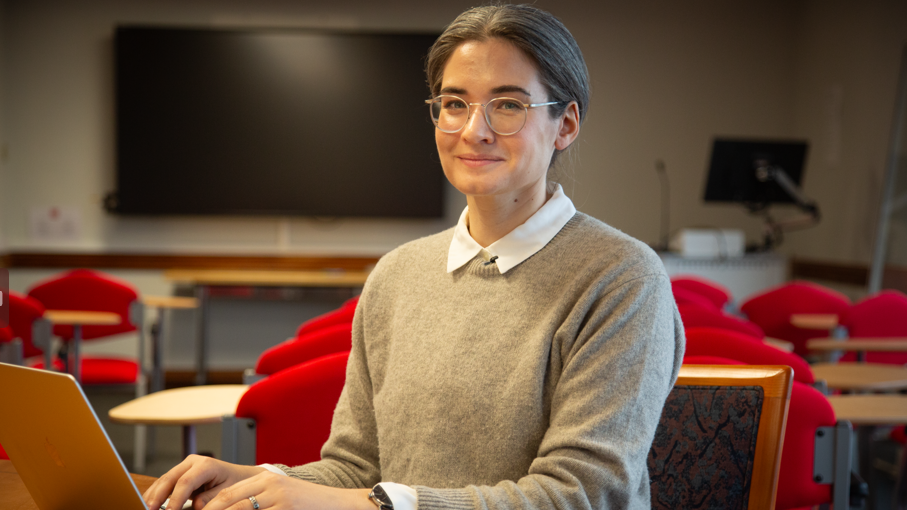Even morphine doesn't help my horrific period pain
"What I go through is not normal, but it is normalised," says Emily
- Published
"It felt like being stabbed, I'd be on my hands and knees in pain."
Emily Handstock, 25 has struggled with period pain for 10 years and has documented the agony she has gone through on TikTok.
"I was admitted to hospital and the morphine barely touched the sides," she said.
She wants others to take part in severe period pain research, which could shape education and research, improving the lives of women.
Emily, who lives in Aberdare, Rhondda Cynon Taf, has felt the agonising effects of her period since she was 15.
"It was horrendous bleeding, I'd have to leave school and go home and change – I'd bleed through tampons and pads," she said.
Women's health hubs for 'every part of Wales'
- Published9 December 2024
Period pain policy reversed as school apologises
- Published10 October 2024
Gynaecology patients going private to avoid NHS waiting lists
- Published9 December 2024
At times, she thought she would pass out because of the pain, but felt society had "normalised" what she was going through.
"Throughout my teenage years I was told, 'you're just experiencing a painful period. You're fine. Just have some ibuprofen and suck it up'," she said.
"The mental toll is also awful, you feel like people won't believe you and worry about being well enough for school or work."
Emily is a sales manager, and said her company had been very supportive when she struggled.
"I'm really lucky that I can work from home to help accommodate the pain, to make sure I'm as comfortable as I can be," she said.
However, the impact of needing time off work has been a concern.
"I have savings, it's something I've always done in the knowledge this could financially impact me by taking time off, I think that's a real worry for lots of people who suffer that they may run out of sick days," she added.
NHS Confederation research, external reported that the economic cost of taking time off due to issues such as severe period pain or ovarian cysts is estimated to be nearly £11bn a year in England alone.
What is severe period pain?
Dysmenorrhea is the medical term for moderate to severe pain that occurs during menstruation
It is usually felt in the lower abdomen or pelvis and can also cause cramping
Other symptoms can include nausea, vomiting, fatigue, diarrhoea, headaches and weakness
Severe period pain is when it affects your daily habits like sleeping or going to work

Emily says it also has an impact on her husband Marcus who has had to watch her "screaming in agony"
Emily is sharing her story as a Westminster report by MPs warned women experiencing painful health conditions, including heavy periods, were being dismissed when they asked for help.
It stated that medical misogyny was leaving women in pain for years and disrupted all aspects of daily life.
Last week, the Welsh government announced the first women's health plan, following similar strategies in England and Scotland.
It includes a focus on menstrual health, including endometriosis - something Emily has welcomed.
Last month, after seven years of tests and scans, Emily had surgery for stage four endometriosis, but had to "fight to be taken seriously".

Dr Robyn Jackowich says it is an exciting and important time in women's health research
Emily is encouraging those who experience severe period pain to share their experiences as part of a study based at Cardiff University, which she said was "a validating experience to be heard".
Dr Robyn Jackowich is one of the researchers running the two-year Health and Care Research Wales Project.
It will create a list of recommendations to both education and healthcare providers.
"There's certainly a need for it, given both how common it is and what an incredible impact it has on the people who experience it," she said.
Dr Jackowich said severe period pain was something that can be experienced on its own or linked to other conditions, such as endometriosis or uterine fibroids, external.
She said that severe period pain makes it difficult to do your day to day activities, such as making it difficult to focus, to move or to sleep.
"Severe period pain is quite common, though the estimates of prevalence range. It's thought to affect up to 29% of women, girls and people assigned female at birth, external," she added.
The study, which is about halfway through, is looking to speak to more people, including parents, teachers and community pharmacists as they "play a big role in young people's education and access to healthcare".